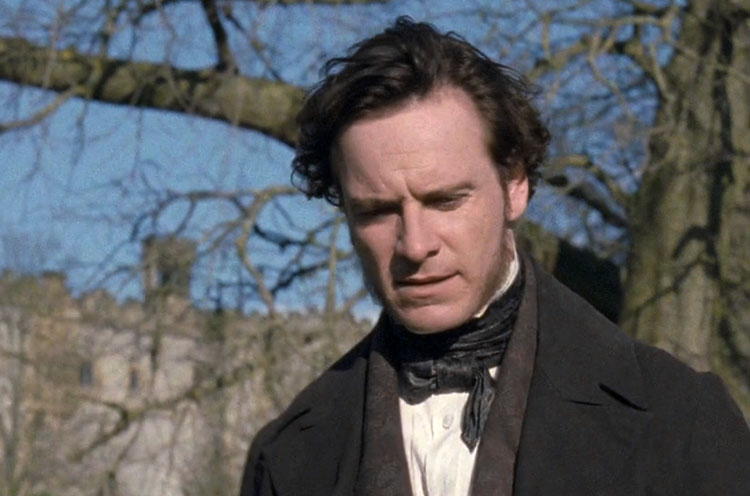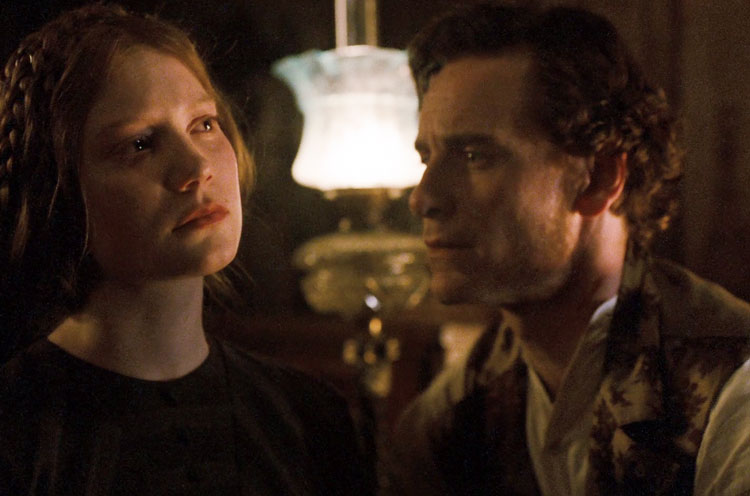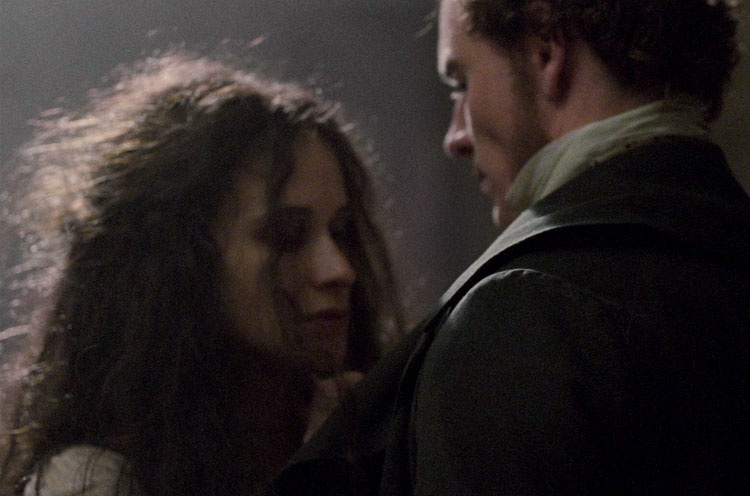
|

|

|

|

|

|

|

|

|

|

|

|


Q: You have the reputation of being a real cinema buff. You were doing TV and then you had a small part in "300." And then suddenly you're making films with Francois Ozon ["Angel"] and Steve McQueen and Andrea Arnold and Tarantino and Neil Marshall and now Cary Fukunaga and David Cronenberg. You really can't claim that isn't deliberate.
A: Yeah, and that's what's always been my goal. I've been unbelievably blessed and lucky to be allowed to be in this position. I mean, I haven't picked them, they've picked me, which is amazing. When I started off doing this, all the films I enjoyed were by major filmmakers. You know, all the usual suspects: Scorsese, Coppola, Sidney Lumet. To be allowed to express myself with the very best of people looking after me, it's — I do feel like I'm dreaming a lot of the time.
Q: So you knew about Cary Fukunaga, right? Who is obviously quite young, but is suddenly hot stuff after "Sin Nombre." Had you seen it?
A: I had, yeah. It was one of my favorite films of that year, and I was fascinated to see what he would do with Jane Eyre, this classic British stalwart piece. What I noticed about "Sin Nombre" is that real sensitivity to human beings and relationships, to how we deal with each other. Obviously that's massive in "Jane Eyre," it's so complex and so layered. I thought he was the man for it, anyway.
Q: So many actors have played Rochester over the years, from Orson Welles to Charlton Heston to, I don't know, Timothy Dalton. Did you watch any of them do it?
A: I figured, you know, that I'd be the first to really get a take on it. No! Just kidding! I watched all of them, really, or as many as I could get my hands on, from Orson Welles through Toby Stephens [in the acclaimed 2006 British miniseries]. I liked Toby Stephens the best, actually, out of all of those I've seen.
Q: Orson Welles really hams it up in that role, as I recall.
A: Wow! [Stentorian Orson Welles voice.] "Jane! Jaa-aane! Jaa-aaa-aane!" Whoa! Slow down! At one point I was also involved in "Wuthering Heights," actually. And I watched Laurence Olivier's Heathcliff. And again, I was like: Whoa, shit! OK, Olivier was great, and Orson Welles — they are who they are. But, shit, this has dated, I gotta say.
Q: I really liked this version of "Jane Eyre" a lot. But the other side of that is that it has a lot of unexpected and raw qualities, and some people will really hate it.
A: Which is good, you know. It's always better to have people that love it or hate it. The worst thing is indifference, you know. If you're stuck in the middle you may have made a bad film. Maybe that's unfair — anyone who manages to get a film made in the first place, that's a real achievement.
Q: As you play Rochester, he almost seems diseased. He's got a secret, obviously. Do we have to warn people about spoilers for a story written 160 years ago? [Laughter.] But it's like he's a drug addict, or he has cancer and hasn't told anyone. Something's eating him inside.
A: Great, great. That's what I was trying to get at. That's what I wanted with him, he's got a shadow on him all the time, this guilty secret, this dirty secret. Everything springs from that secret, from what happened to him in Jamaica. His whole life has been formed from that. You can imagine this guy who sets out for Jamaica when he's young, full of hope, has his whole life ahead of him, and it all goes really wrong. Fifteen or 20 years later, you can see that he's somebody who hasn't opened up to anyone. He has no friends in his life. People come around, but he's a bit odd, you know — Rochester who travels all the time, who's trying to escape from reality.
He doesn't want to fall in love again, because it destroyed him so much that first time around. So when Jane comes along, not only is he attracted to her, but he's also scared of her.

She starts peeling things away from him, and that's what I was trying to work on. Hopefully those elements are exposed.
And here's another thing. When I read it I thought to myself: God, he's quite bipolar. He goes through the ranges, and it can be in one scene. He's gone from seemingly contented and at ease to disgruntled and melancholic and dark. That was the first thing that struck me when I read it, and I thought: Cool, that's interesting.
Q: Have you read the novel? And did you like it?
A: Yeah. I mean, my mother and sister are big fans. It's that thing: Women seem to like that torture — the love that they cannot have! You know what I mean? It’s still happening now with "Twilight." The Bronte sisters live on in the "Twilight" franchise — it's that same thing, the love that you'll never be able to have, even if they're madly in love. They can never be with each other! Why? Why? Why can't they just...?
So, you know, I never got into it when I was a teenager. But in later years when they were doing [Jean Rhys' "Jane Eyre" prequel] "Wide Sargasso Sea" as a two-part series on TV, I read both books, "Jane Eyre" and "Wide Sargasso Sea." That was about six years ago, and then obviously I reread it recently when this came along. I'm very interested to see what my sister and my mother think of this — they haven't seen it yet!
Q: Maybe we can make allowances for the movies, but it's tough to sell Mia Wasikowska, who is so striking, as Jane Eyre, the governess nobody except Rochester even notices.
A: Yeah, that's the thing. The original plain Jane. But Mia's got this great ability to be very striking or just blend into the background. We were doing a photo shoot the other day, and she arrives in her woolly hat and ordinary clothes, just being Mia. Then she puts on these clothes and strikes these poses that just command your attention. Her physical control is amazing, her command of her physicality. That comes from being a dancer, and also the discipline, the way she approaches her work, that bleeds through from her dance training. It's cool, man — it was a real pleasure working with her, and I really think she's got that Meryl Streep quality, she's of the same ilk. She really has something.
Q: I don't want to go all theoretical on you, but one of the great things in this movie is the dynamic between you. There's almost this weird gender reversal, where what you like about her is that she's the tough one...
A: And I'm like an old frantic woman! [Laughter.] I'm like some neurotic woman running around my house, feeding the woman in the attic! Yeah, it's true, and that's what's great about it, especially for the time it was written. The idea that you have this woman who's taking on this guy, the master of the house. She strikes a chord there with men and women — men like strong women, you know? That's why I think it still resonates today. "Wuthering Heights" is the same way. Cathy is so spirited, you know? Not to be messed with. And Heathcliff is the counterpart of that.
Q: And since we're talking about Rochester's big secret, I thought the movie handles her really well. The madwoman in the attic has all this psychological or symbolic resonance, if you like, but she also has to be real.
A: Well, that's it. That's the thing: She's actually physically there, and she's also metaphorically there. I feel sorry for her, man! Think about Victorian England — she might just have been horny! She might have just been a randy woman, and they were like: "You must have the devil in you! You're crazy!" No wonder she wants to burn the house down, she's locked up in that fuckin' room all the time! I don't blame her. It's like the Chekhov play where the dead person is the central character. It's almost like she's the central character in this story. She's the cause of everything. She is forcing Rochester to draw out of his history. She almost becomes Thornfield House.

Q: You were talking about Mia's carriage, and her dance training. When I think about your relative positions in the film, your postures — you're slumped down in the chair, despondent, depressed, cynical. She's upright, optimistic, with an edge. She comes at you like a knife and slices everything open.
A: Yeah, yeah, yeah. She's like a razor blade. She's going to cut the whole house open. "Things are going to change around here!" She doesn't say it, but she doesn't have to. And then the other side of the equation was working with Judi Dench. I just thought: I can't believe I have the opportunity to work with her. That was just so amazing. And I've got to be so mean to her, too! But she's so cool. She has apparently forgiven me.
Q: You shot the film in the Peak District, very close to the actual setting of the novel, and I feel like Cary and his cinematographer caught something of the primitive, almost wild character of that place. It doesn't feel coddled or pretty. It's not Victorian, at least not in the comfortable, garden-party sense.
A: Exactly. I wanted Rochester to be out there digging in the dirt, digging up the garden. One of Rochester's more appealing qualities is that the class system disgusts him. When he has Lady Ingram and those people around, he doesn't like any of those people. He has to entertain and go through the motions, but he's somebody who works with the earth, who goes out hunting. It's not the old caricature [sipping tea and humming a Baroque melody]. There was a dirt to it. People didn’t have showers, so there was dirt on their hands. As you just said, there's something very primal about it. Beneath the elegance and the repression, the beast was not very far underneath. These guys were just as decadent as anybody today; they were doing all kinds of crazy shit. Rochester has been to brothels, has dabbled in drugs, or at least that's what I think.
Q: Our time is up, but tell me something about playing Carl Jung in the Cronenberg film. I totally can't wait to see that.
